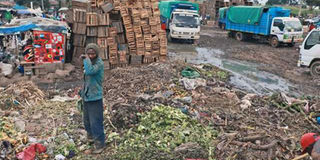The false promises, failures that have left Nairobi filthy

Garbage strewn at Muthurwa Market in Nairobi on Monday, March 9, 2020. PHOTO | DENNIS ONSONGO | NATION MEDIA GROUP
What you need to know:
- Governor Sonko once accused staff of colluding with cartels to frustrate his efforts.
Residents and traders have also contributed to the problem by dumping waste on the streets.
Business owners have come under fire for using street children to illegally dump their solid waste.
As Nairobi City suffocates under mounds of garbage, the county government is on the spot for its lax approach to dealing with the problem. But the blame is shared by many others.
City Hall officials, elected county leaders, business owners and residents are all to blame.
Business owners have come under fire for using street children to illegally dump their solid waste, contributing to the rot in the city.
Unwilling to employ the services of private garbage collectors in order to cut costs, the wily businesspeople use street families to dispose of the waste.
Many alleys and streets in the central business district (CBD) and Nairobi River have borne the brunt of this action by rogue traders.
“The city centre is always dirty as business owners in the hotel industry pay street kids to pick up garbage from the backdoors of the hotels at night and dump it along the alleys,” said a trader.
Nairobi residents are not clean, either. They have turned corridors and paths in the estates and informal settlements into dumping sites.
In the CBD, they throw all forms of solid waste on the roads as they walk, and from matatus and private cars.
Then there are elected leaders in the county who have joined “cartels” in the garbage collection and disposal business.
The leaders are said to be at the heart of the garbage business in the capital city, with a number of them controlling illegal dumping sites across the county and frustrating any efforts at cleaning up the city.
Governor Mike Sonko has in the past complained about the cartels, saying his administration’s clean-up campaign was being sabotaged by cartels.
“Anyone found soliciting the services of these vicious cartels risks having their business licences revoked,” he said then.
However, the biggest blame must be shouldered by City Hall, which has failed to rein in the garbage cartels.
It has also failed to actualise any of the garbage-related projects it had promised despite millions being allocated to the Environment department to deal with the problem.
Just two months after coming into office, Governor Sonko unveiled 40 garbage trucks to help accelerate the clean-up of the county. The trucks were to be managed by Sonko Rescue Team and county staff.
They were to be used to collect domestic and other solid waste, which had been ongoing since the launch of “Operation Ng’arisha Jiji” in August 2017.
In January 2018, the county government was to place garbage containers in wards, estates and in the CBD to ease garbage collection.
This was after private garbage collectors downed their tools demanding over Sh150 million in arrears.
Youth groups
The first phase was to see the distribution of 40 such containers, with youth groups taking charge at the ward and estate levels.
Sub-county administrators were to handle collection in their zones, with each of the 17 administrators controlling two trucks.
“The first phase of this initiative will see 40 garbage containers distributed in various wards and estates with high concentration of garbage. The containers will be placed at strategic areas, with the collectors carrying out the duty on a daily basis during morning hours,” said Governor Sonko at the time.
The county boss added that henceforth, waste management would be handled at estate and ward levels, with county staff in charge of collecting the garbage from the containers and taking it to the county dump sites.
Nothing ever came out of the elaborate plan. Instead, mounds of garbage continued to pile across the county.
A month later, the governor said his administration was in the process of acquiring 25 modern garbage wagons.
He said the wagons, which were being assembled locally with the help of foreign experts, would be deployed in all the 17 constituencies in the county. Just like the projects before it, this was also never actualised.
But the governor was adamant that his administration was making progress.
As a short-term measure, he later said, the county was going to construct temporary garbage collection points across the wards, place garbage containers at strategic collection points within the CBD and place dust bins in all major estates.
These temporary dumping points were to be cleared on a daily basis.
“The ward collection points will be built using iron sheets … This will ensure Nairobians have easy access to dumping points,” the governor said.
Once again, nothing happened.
Sensing he had run out of excuses, Mr Sonko accused county staff of colluding with cartels to undermine his strategy to clean up the city.
As the county and elected leaders continue to make empty promises, Nairobi residents are left to suffer the eyesore of ever growing filth despite paying taxes to City Hall.
“No customer in their right mind would buy any arrowroots from my stall. Look at this effluent. My chest is hurting because I breathe in this foul air every day,” Ms Amondi, a vendor at Muthurwa market, said.
“If the government and the county cannot clean up this mess, then they should stop taking levies from us. Let us clean up on our own. We can do better on our own,” Stanley Saka, a businessman at Muthurwa, said.





